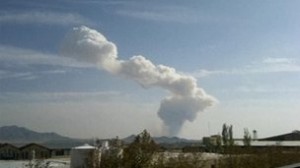
Yesterday’s New York Times and presumably other major newspapers as well carried a small story on an inside page about a violent explosion that took place at an Iranian test facility, killing one of the country’s top rocket scientists, among others.”There was immediate speculation that Israeli saboteurs were responsible for the blast, which Israeli officials did not go out of their way to dispute,” the Times reported. As for Iranian officials, the country’s chief of staff said the event had “no relation to either Israel or America,” except that it somewhat set back efforts to position Iran to deliver “a strong punch in the mouth of Israel and its occupying regime.”
He went on to say “that research will have a short-term delay of a few days, but definitely the forces and compatriots of Martyr Hassan Tehrani Moghaddam [the rocket scientist killed] will continue on that path, and the product of his life’s efforts will be a punch in the mouth of Israel.”
In the last year, there were simultaneous attempts to assassinate two of Iran’s top nuclear scientists–one successful–which are universally taken to have been the skillful work of Mossad. The scientist presumed by the IAEA to be running Iran’s nuclear weaponization efforts, Dr. Mohsen Fakhrizadeh, has gone into hiding, Iran having refused to making him available to IAEA inspectors for questioning.
In Israel, it’s an open secret that the government is engaged in a top-level debate about whether to launch preemptive military strikes against Iran, with some former top intelligence officials having taken the unusual step of publicly warning the government against such folly–not because action would not be warranted, but because it won’t work.
Under the circumstances, it seems necessary and timely to state the obvious, which is that Israel and Iran are hovering on the brink of war. They are at present in a state of virtual war, and not the kind of virtual war Michael Ignatieff wrote about–wars dominated by computer-driven, remotely controlled precision weaponry. They are in a state of virtual war in the old-fashioned sense: That is to say, they are very nearly at war.
And that’s not the worst of it. What even worse is that when the Iranian chief of staff talks about delivering a punch in the mouth everybody understands him to mean a nuclear punch in the mouth. Akbar Hashemi Rafsanjani, who is believed to have played a major role in initiating Iran’s nuclear weapons program and who is still a major figure in Iranian politics, was once notoriously explicit. In one of his weekly Friday sermons, he said on Dec. 14, 2002: “If one day. . . the world of Islam is mutually equipped with the kind of weapons which Israel presently possesses, the world’s arrogant [colonialist] strategy will then come to a dead end, because the use of an atomic bomb on Israel won’t leave anything; however, in the world of Islam [use of a bomb] will just cause harm, and this scenario is not far-fetched.”
If Iranian leaders are still talking about such nuclear punches in the mouth in public, it doesn’t take much imagination to divine what’s being said at the top levels in Israel in private. If Iran’s nuclear program represents an existential threat to Israel, if military action is in principle an appropriate response, but if conventional military action cannot get the job done, then the next logical step is . . .
The danger here, and it’s an acute one, is that leaders on one side or the other might find themselves trapped into actually doing what they say they might do.
Much as one hates to trot out the usual cliche about how if one does not sharply change direction, one will end up where one’s headed, it’s high time for Israel and Iran to find some way of radically changing course, jointly. And it’s high time for their patrons–Russia and China on the one hand, the United States on the other–to engage in the hardest of head-knocking.